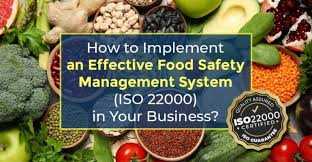Achieving FSSC 22000 certification is a pivotal step for organizations seeking to ensure food safety and enhance their operational standards. The FSSC 22000 Certification, recognized internationally, provides a framework for managing food safety responsibilities and demonstrates a commitment to quality and safety across the supply chain. Partnering with IRQS (Indian Register Quality Systems) for this certification process can significantly streamline your journey toward compliance and excellence.

The FSSC 22000 certification process begins with a thorough understanding of the requirements laid out in the standard. It incorporates the ISO 22000 framework, which focuses on the management of food safety systems, and integrates additional sector-specific prerequisites from ISO/TS 22002-1, creating a comprehensive certification approach. Organizations aiming for certification must first perform a gap analysis to assess their current food safety management systems against the FSSC 22000 requirements. This analysis helps identify areas needing improvement, allowing organizations to implement the necessary changes proactively.
Once the gap analysis is complete, the next step is to establish a robust food safety management system (FSMS) that aligns with FSSC 22000 standards. This involves defining key processes, documenting procedures, and training employees on food safety protocols. IRQS provides expert guidance during this phase, offering training programs that equip staff with the knowledge and skills needed to maintain high food safety standards. The training covers essential topics such as hazard analysis and critical control points (HACCP), risk assessment, and continuous monitoring of food safety practices.
After implementing the FSMS, organizations are required to conduct an internal audit to evaluate the effectiveness of their system. This audit serves as a critical self-assessment tool, helping identify any deficiencies or non-conformities that need addressing before the certification audit. IRQS offers internal audit services, ensuring that organizations are well-prepared for the official certification audit. Their experienced auditors provide constructive feedback and assist in developing corrective action plans to mitigate any identified issues.
The certification audit is the final step in the FSSC 22000 certification process. During this audit, IRQS auditors will assess the FSMS to verify its compliance with the FSSC 22000 requirements. The audit typically includes a review of documentation, interviews with staff, and observation of practices within the organization. If the audit is successful and any non-conformities are adequately addressed, IRQS will issue the FSSC 22000 certification, recognizing the organization's commitment to food safety.
Maintaining FSSC 22000 certification requires ongoing commitment and continuous improvement. Organizations must regularly monitor and review their food safety management systems to ensure compliance and adapt to any changes in regulations or industry best practices. IRQS provides support even after certification, offering recertification audits and consultancy services to help organizations maintain their certification status and improve their systems over time.
In conclusion, partnering with IRQS for FSSC 22000 certification not only facilitates a smoother certification process but also enhances your organization’s reputation in the global food industry. With over 25 years of experience and a successful track record with more than 5,000 clients worldwide, IRQS is well-equipped to guide your organization through the intricacies of the FSSC 22000 certification process, ensuring that you meet the highest food safety standards. Embrace the journey towards excellence in food safety with IRQS as your trusted partner.







